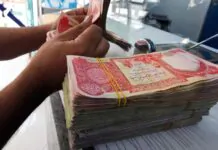Good Afternoon,
FEDERAL TAXES TO BE ‘SUBSTANTIALLY REDUCED’ ONCE TARIFFS SET IN: TRUMP
The US President previously floated the idea of eliminating the federal income tax altogether and replacing it with import duty revenues.
United States President Donald Trump recently said that federal income taxes would be “substantially reduced” or potentially eliminated once the tariff regime fully sets in.
In an April 27 Truth Social post, Trump added that the focus of the purported tax cuts would be on individuals making less than $200,000 per year.
The US President also said that the “External Revenue Service” — a reference to funding the federal government exclusively through import tariffs instead of the current model of collecting taxes through the Internal Revenue Service (IRS) — is materializing.
Eliminating the federal income tax would likely be a positive catalyst for asset prices, including cryptocurrencies, as the increase in disposable income should partially flow back into productive investments. However, this stimulative effect is not guaranteed.
Trump’s plan leaves analysts and markets doubting
Trump previously floated the idea of eliminating the federal income tax in an October 2024 appearance on the Joe Rogan Experience, although Trump, who was on the campaign trail at the time, provided scant concrete details on the proposal.
The US President suggested that replacing the federal income tax with revenue from import duties would return the US to a time of prosperity seen during the Gilded Age, in the 19th century, when the US did not have a permanent federal income tax.
Research conducted by accounting automation company Dancing Numbers found that Trump’s proposal could save the average American $134,809 in lifetime tax payments.
Dancing Numbers added that the tax savings could be as much as $325,561 per American if other wage-based income taxes are also eliminated.
On April 2, Trump signed an executive order imposing sweeping tariffs on all US trading partners, which included a 10% baseline tariff on all countries and different “reciprocal” tariff rates on countries with import duties on US goods.
However, since that time, the Trump administration walked back its tariff policies several times, flip-flopping on tariff rates and when the tariff regime would fully take effect.
The Trump administration’s ever-changing rhetoric surrounding trade policies has heightened volatility in the US stock market, caused a rise in US bond yields, and has drawn widespread criticism from financial analysts who say the protectionist trade policies hurt capital markets while achieving little else.
@ Newshounds News™
Source: Cointelegraph
~~~~~~~~~
BRICS: US SANCTIONS FAIL AS RUSSIA’S ECONOMY GROWS 4.1%
The US pressed sanctions on Russia in February 2022 after they invaded and waged war on their neighboring country Ukraine. The sanctions were aimed at stalling Russia’s growth and bringing its overall economy and GDP down. Russia teamed up with the BRICS alliance and the bloc kick-started the de-dollarization agenda to counter the US sanctions.
The BRICS bloc rewrote trade deals allowing Russia to send and accept local currencies for trade and cross-border transactions. China, India, and Saudi Arabia made use of the US sanctions and procured Russian oil and discounted prices. Saudi Arabia even brought Russian crude oil for a concession and laundered it all over Europe earning bigger profits.
BRICS member India even saved $7 billion in foreign exchange by buying Russia’s crude oil at cheaper prices due to the sanctions. Therefore, the BRICS bloc mostly benefitted from the US sanctions saving and earning billions in development. They even pushed local currencies ahead for trade strengthening their businesses and overall GDP.
BRICS: Russia’s Economy Grows 4.1% Despite US Sanctions
Trade restrictions could not stop BRICS member Russia’s growth as it immediately kick-started the de-dollarization agenda. The move helped the country navigate through troubled times and simultaneously gained the support of developing countries. “Over the past two years, the Russian economy grew by 4.1%,” said Russian Security Council Secretary Sergey Shoigu.
The latest data shows that BRICS member Russia’s economy comfortably sat above 4% despite the US sanctions.
2023: 4.1%
2024: 4.3%
2025 (Projection): 2.5%
Shoigu explained that BRICS member Russia’s banking system demonstrated remarkable resilience during the US sanctions. “Russia’s external and internal debt has diminished. Its financial and banking systems demonstrated resilience,” he said.
The diplomat added, “The external trade also retained its positive dynamics. Despite sanctions, the past year’s trade grew by $3.8 billion, to over $716 billion. Proficit of the balance of foreign trade gained $7 billion, reaching approximately $146 billion.”
@ Newshounds News™
Source: Watcher Guru
~~~~~~~~~
Seeds of Wisdom Team RV Currency Facts Youtube and Rumble
Newshound’s News Telegram Room Link
Q & A Classroom Link
Follow the Roadmap
Follow the Timeline
Seeds of Wisdom Team™ Website






